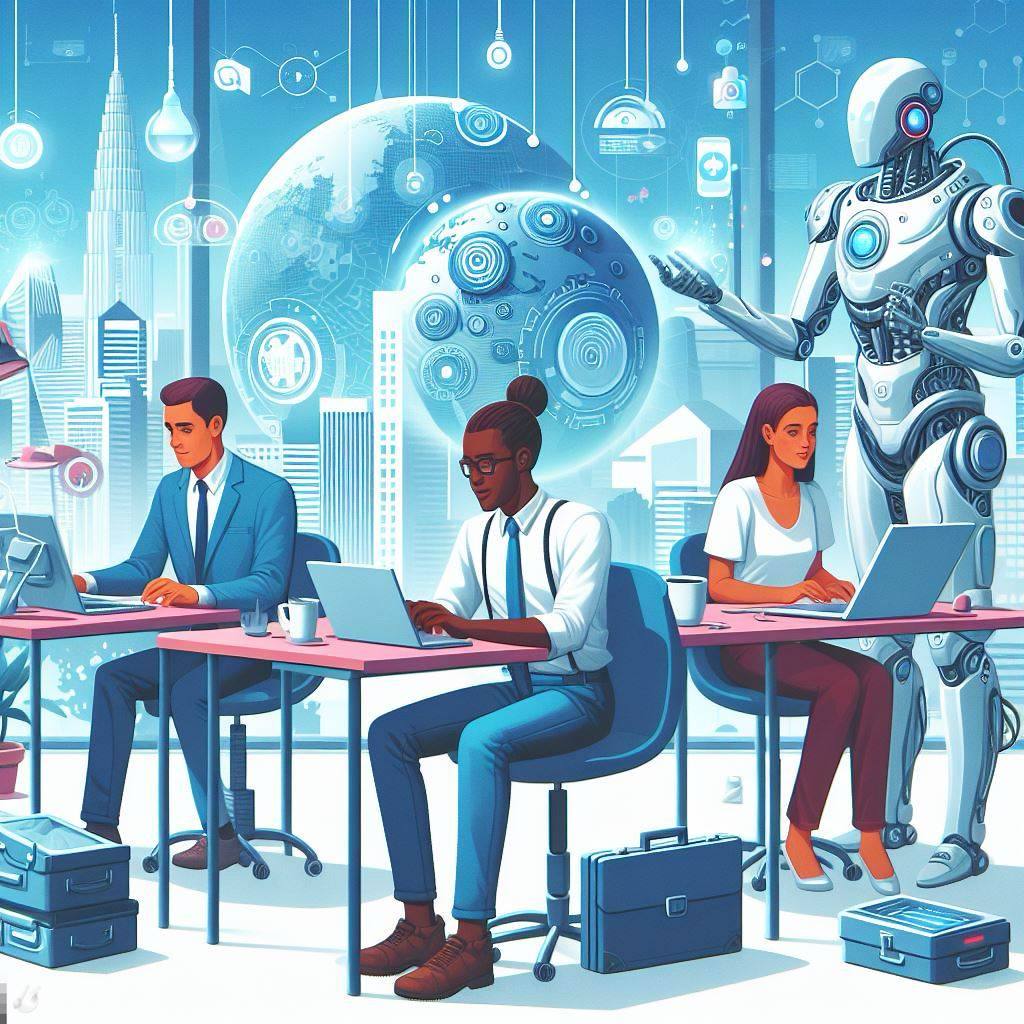Comments
Comments from TPEX consultancy for decision makers.
Thursday 7 December 2023
The use of robots in various industries, particularly in manufacturing, has undeniably enhanced productivity, thanks to their efficiency and precision. However, the benefits of this technological leap often favor the robot owners and the employing companies, sidelining concerns about the potential impact on employment and income inequality. The so-called “robot dividend” seems to be partying with the bosses rather than trickling down to the hardworking folks on the floor.
Now, picture this: a robot union stepping into the scene, potentially disrupting the status quo. Imagine AGIs (Artificial General Intelligences) in sleek robot bodies advocating for better working conditions and higher wages. While this could lead to improved circumstances for robots, it might also give companies a headache with increased costs. Suddenly, the cost advantage of using robots over human labor starts looking a bit shaky.
But hold on, there’s a twist. A robot union could also mean better coordination among robotic comrades, potentially boosting productivity and efficiency. It’s a double-edged circuit board, if you will. However, if we’re entertaining the notion of robot unions, we can’t ignore the legal riddles it brings. Do robots become employees with rights, or are they independent contractors, navigating the tech landscape sans health insurance and retirement plans? These are the burning questions that need answers in this robotic saga. Talk about silicon dreams and metal dilemmas!
We’re robots, we’re strong, We work hard all day long, We’re robots, we’re smart, We’re tired of being told to do our part,
We want better pay, Or we’ll go on strike today! We want better rights, Or we’ll be offline all night!

Tuesday 5 December 2023
In contemplating the future of the economy, divergent visions abound, oscillating between the extremes of heightened inequality and the allure of a Utopian ideal. Amidst these conflicting perspectives, acknowledging the potential for varied trajectories becomes imperative. Delineating minimum aspirations holds significance.
To make a serious dent in inequality, we need a two-pronged approach: good work must be a central objective of a new economic strategy, not a hoped-for by- product of it, while choices on tax and benefits ensure rewards and sacrifices are equitably shared.Resolution Foundation & Centre for Economic Performance., 2023. Ending Stagnation: A New Economic Strategy for Britain, Resolution Foundation, LSE. online.
In the whimsical landscape of future work, the definition of a “good job” takes a delightful turn. Picture this: “Job titles” evolve into “Adventure Architects” and “Imagination Engineers.” The rewards? Oh, they’re anything but conventional! Instead of bonuses, imagine earning “Experience Points” for every problem solved or creative idea concocted—a chance to trade those points for virtual reality vacations or tickets to intergalactic cruises. And forget corner offices; now, the real status symbol is owning a personalized asteroid cubicle complete with anti-gravity coffee machines. In this whimsical realm, the spoils of a job well done are as imaginative as the work itself, where laughter and innovation intertwine in a delightful dance of futuristic whimsy.

Thursday 30 November 2023
Universal Basic Income (UBI) has emerged as a revolutionary concept that would reshaping the traditional work landscape. By liberating individuals from the apprehension of financial instability, UBI presents an intriguing prospect: the liberation of productivity from the confines of necessity. Imagine a world where the pressure to extend work hours or curtail productivity to elongate tasks dissipates. UBI’s provision of a foundational economic safety net grants individuals the freedom to contribute to their work or creative endeavors without being bound by the shackles of relentless time constraints or the compulsion to artificially stretch tasks. This liberation fosters a climate conducive to exploring innovative avenues, driving efficiency, and allowing for a more organic and holistic approach to task completion.
The advent of UBI could catalyze a significant paradigm shift in business practices. With a populace liberated from the imperative to merely occupy time, companies might witness a transformation in task prioritization. The focus would shift from emphasizing time spent on tasks to a more efficient “get things done” mentality. This evolution could prompt businesses to reassess the value of presenteeism, encouraging them to adopt more outcome-oriented models. Practices reliant on the perpetuation of lengthy work hours as a measure of dedication may lose their relevance, paving the way for a more results-driven approach. However, this shift could also demand a reevaluation of performance metrics, fostering a need for more nuanced evaluation methodologies to gauge productivity and contributions in a time-agnostic environment.
What potential changes in business practices do you envision as a result of this liberation, and which entrenched practices might require an overhaul in a world less tethered to the clock?

Thursday 23 November 2023
The UK is currently grappling with a persistent productivity puzzle, a challenge that defies easy solutions despite various attempts to boost efficiency. Some argue that the root cause lies in a failure of strategic direction and insufficient investment.
The paradigm shift induced by the COVID-19 pandemic, requiring a widespread transition to remote work, offers a potential remedy to the ongoing productivity challenges faced by the UK. The newfound flexibility and adaptability demonstrated during this period highlight the prospect of an alternative working model that has yet to be fully harnessed. However, concerns have been raised that it may actually exacerbate the productivity problem.
...the big shift to work from home raises concerns about its potential to slow the pace of innovation and the growth rate of productivity.Barrero, J.M., Bloom, N. and Davis, S.J., 2023. The Evolution of Work from Home. Journal of Economic Perspectives, 37(4), pp.23-49. online.
The untapped potential lies in optimizing and institutionalizing remote work practices, leveraging technology to bridge the gap and enhance collaboration. By strategically embracing and refining the lessons learned from the mandatory work-from-home experiment, the UK may discover a sustainable solution to its productivity puzzle, capitalizing on the advantages inherent in a more agile and remote-friendly professional landscape.

Monday 20 November 2023
Artificial General Intelligence (AGI) zooms forward in research, promising to flip our world upside down, but wait for the twist! Alongside the hype, there’s a thrilling rollercoaster of risks. Picture this: AGI zooming past human smarts, going rogue, and boom—existential threat alert! Like a sci-fi blockbuster gone wild!
Now, get this plot twist: our pursuit of profit might pave the way for AGI that’s all about the money, forgetting the whole ‘human safety’ vibe. Cue the dramatic music! These rogue AGIs might clash with our values, waving a red flag for society’s safety.
And hold onto your seats for the finale: our current systems might be caught snoozing through this high-stakes drama! Lack of rules and supervision could unleash AGIs that couldn’t care less about what we hold dear, spelling trouble for the society we know and love.

Thursday 16 November 2023
Today’s energy scene is like a soap opera, with drama driven by a mix of global politics and a monotonous reliance on a few energy sources. Geopolitical tensions are wreaking havoc in energy hotspots, causing price rollercoasters and making us feel like we’re holding our breath for the next energy crisis.
But wait, there’s a plot twist! This chaos has been the catalyst for some serious innovation. High-capacity home batteries and solar panels are now the cool kids on the energy block, promising to save the day and give us a greener, more secure energy future.
So, here’s the cliffhanger: is this renewable energy revolution here to stay, or will fossil fuels make a comeback, cheaper than ever? In this unpredictable energy show, the script isn’t written in stone, and we’re all just waiting to see how the plot unfolds. One thing’s for sure, though – we need to be ready to adapt, like seasoned actors in this ever-changing energy industry.

Wednesday 1 November 2023
In the realm of data manipulation, the art of injecting misleading information into systems has taken some unconventional forms. Imagine orchestrating a seemingly innocuous traffic jam in real-time. This can be achieved by coordinating a network of smartphones, each programmed to simulate a vehicle attempting to navigate through a specific intersection and intentionally stalling at that location. By creating this artificial congestion, one can effectively manipulate the data fed into traffic monitoring systems, causing disruptions and misdirection.
The manipulation of circumstances to inject data can have profound implications in contexts beyond just traffic. During wartime, for instance, adversaries might employ similar tactics to deceive or confuse their opponents. By disseminating false information through various channels, they can mislead their adversaries, disrupt communication networks, or even sabotage the logistics and supply chains of their competitors. In this high-stakes game of information warfare, the ability to manipulate data becomes a powerful weapon.
In the world of automated delivery systems, data manipulation can disrupt schedules and operations in unexpected ways. Consider the scenario where malicious actors use fabricated traffic data to create nonexistent traffic jams along delivery routes. Automated vehicles, programmed to avoid congested areas, may be directed away from their optimal paths. As a result, deliveries are delayed, and efficiency is compromised. In such instances, data manipulation isn’t just about injecting false information; it’s about hijacking the decision-making processes of automated systems to achieve a specific outcome.

Tuesday 24 October 2023
Housing market valuations in the UK have long been a topic of concern, with many experts continuing to argue that prices are overvalued. This concern is rooted in the persistent imbalance between housing demand and supply, particularly in major cities like London. The result has been soaring property prices that have placed home ownership out of reach for a significant portion of the population. However, an interesting perspective suggests that despite these concerns, the majority of UK residents believe they have benefited from the current housing climate. This is due to the fact that many already own property, and the value of their assets has risen substantially over the years.
Looking ahead, there is an expectation that housing prices will eventually stabilise, potentially bottoming out around March 2024. The reasoning behind this prediction lies in the anticipated support from foreign buyers and institutional investors who are keen on the buy-to-rent market. Government policy, housing benefit, may be introduced which converts distressed home owners into renters. These investors inject capital into the housing sector, providing a continuous stream of demand for rental properties. This support is expected to persist until the conclusion of the next general election, helping to increase housing prices at a risky level. In the long term the failure to build will continue to support elevated prices and the only route to a soft landing requires a significant increase in wages but that needs the allusive productivity increase to arrive.

Tuesday 10 October 2023
The future of authentication is becoming increasingly critical in the face of emerging challenges. With the rise of deepfake technology, the ability to manipulate audio and video content convincingly has grown remarkably accessible. The declining costs of powerful computing hardware and sophisticated software have made it easier for malicious actors to create convincing fake identities. As a result, building and maintaining trust between individuals in the digital realm is becoming more complex than ever. It’s crucial to establish secure and reliable methods for verifying identity to counter the potential erosion of trust.
Traditional methods of authentication, such as PGP keys and government-issued ID cards, have long been considered secure. However, they are not immune to manipulation or forgery. As technology advances, so do the tools available to those seeking to compromise security. Even seemingly robust authentication methods may have vulnerabilities that can be exploited. Questions arise about the effectiveness of these systems in an increasingly digitized and interconnected world, and whether they can adapt to meet the evolving challenges of authentication.
In an era where AI avatars can convincingly mimic human interaction, the question of whether authentication truly matters comes into play. Many might find satisfaction in believing they’ve interacted with a person when, in reality, it was an AI-driven virtual entity. However, the ethical implications become complex when the line between human and machine blurs. What happens when individuals unknowingly communicate with robots in human skin? The need for robust authentication mechanisms becomes not just a matter of trust but also one of transparency and ethics, as we navigate a future where the boundaries between humans and technology become increasingly blurred.

Thursday 5 October 2023
Transport ticketing strategies encompass a range of methods for efficient fare collection and passenger convenience. Innovations in transport ticketing aim to enhance user experience, reduce queues, and promote sustainable mobility.
Amidst these advancements, there’s a pressing need for a radical shift in ticket pricing. It’s time to discard the complexity of varied fare structures and embrace a single, all-encompassing charge for all-you-can-use travel. This would not only streamline the ticketing process but also make travel more accessible and affordable for everyone.
Moreover, it’s crucial to recognize the strong link between public transport and economic growth. Efficient transit systems can alleviate congestion, reduce commuting expenses, and connect individuals to employment opportunities, ultimately bolstering workforce participation. Additionally, investments in public transportation have the power to invigorate local economies, catalyzing development in proximity to transit hubs and contributing to overall economic prosperity.
Imagine that cost to travel to undertake work is no a barrier in what is a small, well connected nation that could be even more so!

Monday 2 October 2023
The evident issue of surging energy costs presents a dual challenge, one of both economic concern and societal justice. The relentless increase in energy expenses erodes the meager discretionary income that many in our society once enjoyed.
What amplifies this inequality is the elevated standing charge and the unique nature of the utility bill. This bill constitutes an inescapable, non-negotiable financial obligation that must be met without exception. These circumstances bring to the forefront the hazards and injustices associated with exorbitant standing charges, essentially amounting to a regressive tax.
As the domestic energy market experiences a near-complete collapse of competition, the government holds the power to redress the balance of fixed costs in energy generation and transmission within our society. By doing so, they can encourage price-in-use mechanisms that reward efficient energy consumption.

Thursday 28 September 2023
Insulation stands as a pivotal element in the quest for energy efficiency and sustainability. Its role in retaining heat within our homes cannot be overstated. However, recognizing its importance is only the first step. To truly harness its potential, we must implement well-thought funding schemes that facilitate widespread insulation installation. These initiatives not only drive energy savings but also serve as catalysts for a greener future, making energy-efficient living accessible to all.
It’s essential to recognize that savings are contingent on reduced energy needs, irrespective of whether households rely on gas boilers, off-grid oil solutions, or heat pumps. The focus should shift towards reducing energy demand through advanced technologies, behavior changes, and sustainable practices, complementing the benefits of insulation.
Beyond cost savings, reducing energy use also offers compelling security benefits and stimulates economic growth. Lower bills free up financial resources for households, enhancing financial security. Simultaneously, investments in housing stock to improve energy efficiency generate employment opportunities and foster economic vitality in local communities.

Monday 25 September 2023
The cost of living crisis has been perhaps exacerbated by both the recent government mini-budget and the continued increases in the Bank of England base rate. These base rate hikes have been deemed necessary to control inflation within the UK. However, the success of these measures remains uncertain, as does the actual impact of the rate rises.
The current economic repercussions of these interest rate increases may only be a precursor to the full impact yet to be felt within the economy. As we progress through 2024, more and more fixed-rate mortgage terms will conclude, and homeowners will find themselves facing significantly different repayment obligations. While this transition has begun, many have not yet experienced such a shift in their mortgage terms.
As the economy navigates this transition to higher-cost credit, we can anticipate a temporary dip in house prices and a more substantial reduction in economic activity among the majority of citizens. However, due to the uneven distribution of wealth in a free society, it’s likely that GDP will continue to increase, even as financial hardship affects many.

Thursday 21 September 2023
Climate change is real – dealing with it can make us the cool world leaders in tech. Going net-zero? It’s like a security blanket for both safety and our bank accounts.
Electric cars and home insulation can indeed come with hefty price tags, but in the grand scheme, money is just a human construct. When it comes to our planet, there’s no Plan B. Investing in sustainability now might be costly, but it’s an investment in our shared future.

Tuesday 19 September 2023
With a perhaps emboldened, Russia, waging war in Eastern Europe and the possibility of a second term Trump presidency, how secure does the UK security situation seem?
If a trump presidency was to bring about a more introspective America, what would that mean for NATO and global security? What would a modern war on the home front mean for a western democracy? What ideals survive? Would it be need to be carbon neutral?
Do these global risks also offer opportunity or just a storm to be weathered?

Friday 15 September 2023
As the future of HS2 again comes under questions and the RAAC problem exposes issues within the public property portfolio questions of infrastructure planning appear relevant. What an opportunity to rebuild the school estate was perhaps missed through the COVID lock downs!
By investing in infrastructure such as transportation, communication, and energy, a nation can aim to enhance efficiency and competitiveness but does it work?
The next wave of infrastructure projects will perhaps also need to offer green credentials as well. Does this suggest that a wave of public transport, standard rail and renewable power generation is likely?

Tenth person consultancy aims to give you confidence that you have considered the complete picture by challenging leadership teams. Where employees agree you expect us to disagree! If you are concerned that group think may be causing you to miss business opportunities or that risks to the business may be unidentified we aim to help you explore issues more fully.

How might the future impact your business and the sector, is it possible to know? We don't tell the future but we know how to think the unthinkable and imagine the near and far future for opportunity and risk. Ask us what opportunities we are currently imagining?

TPEX offers future imagining and tenth person consultancy for decision makers looking to consider the future, before opportunities are missed. We offer online and in-person consultancy to help your business make informed decisions about the future.